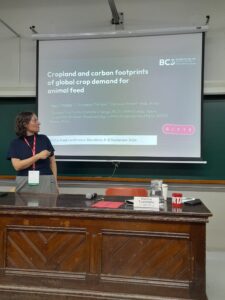

The 14th edition of the biennial LCA Foods Conference took place in Barcelona, Spain, from September 8 to 12, 2024, hosted by the Catalan Institute of Agrifood Research and Technology (IRTA). This global event brought together leading experts in life cycle assessment (LCA) to explore the latest advancements in sustainable food systems. Over four days of intensive discussions and presentations, participants delved into a wide range of topics through several parallel sessions. Key areas of focus included:
- Combined nutritional and environmental assessment of foods and diets
- Sustainable livestock and cropping systems
- Fisheries and aquaculture sustainability
- Novel foods and protein diversification
- LCA of companies, ecolabeling, and communication of LCA results.
Presentations highlighted methodological advances in databases, life cycle inventory analysis, and impact assessment methods. Cutting-edge studies were also presented on the environmental footprints of various agricultural and livestock systems, as well as different agri-food processes and technologies, including by-product reuse and valorisation for more circular applications. The featured plenary sessions that emphasized the pivotal role of soil health in creating sustainable and resilient food systems. A call was made for reversing current production and consumption models to create the conditions necessary for positive tipping points in global food systems. The conference highlighted the interdisciplinary nature of life cycle analysis, which increasingly integrates insights from fields such as economics, engineering, animal, health, and soil science. This exchange helps develop robust quantitative methodologies that bring transparency to environmental impact assessments and value chains, addressing the complex sustainability and health challenges faced by the global food system. The full program can be viewed here: LCA Foods 2024 Program.
GIFTS researcher Neus Escobar made her contribution to the conference by presenting the new Agro-SCAN, a physical Multi-Regional Input-Output (MRIO) database, during the session “Life Cycle Inventory: Modelling, Databases, and Tools (I).” Agro-SCAN, built from FAOSTAT data, is the most detailed physical MRIO to date, covering 640 agri-food products across 181 countries. The database is expected to support environmental footprint analyses by providing comprehensive background data for life cycle inventories. A publication detailing the methodology and findings is expected soon. In another session, “Sustainable Livestock Systems (III),” Escobar presented her ongoing work with the FAO Livestock Division, focusing on the environmental footprint of feed—a critical factor in sustainable livestock production. Discussions also highlighted Agro-SCAN’s potential to support both hybrid and consequential LCA by tracking the origins and quantities of feedstocks used for food, feed, and non-food purposes in the period 2013-2020.



